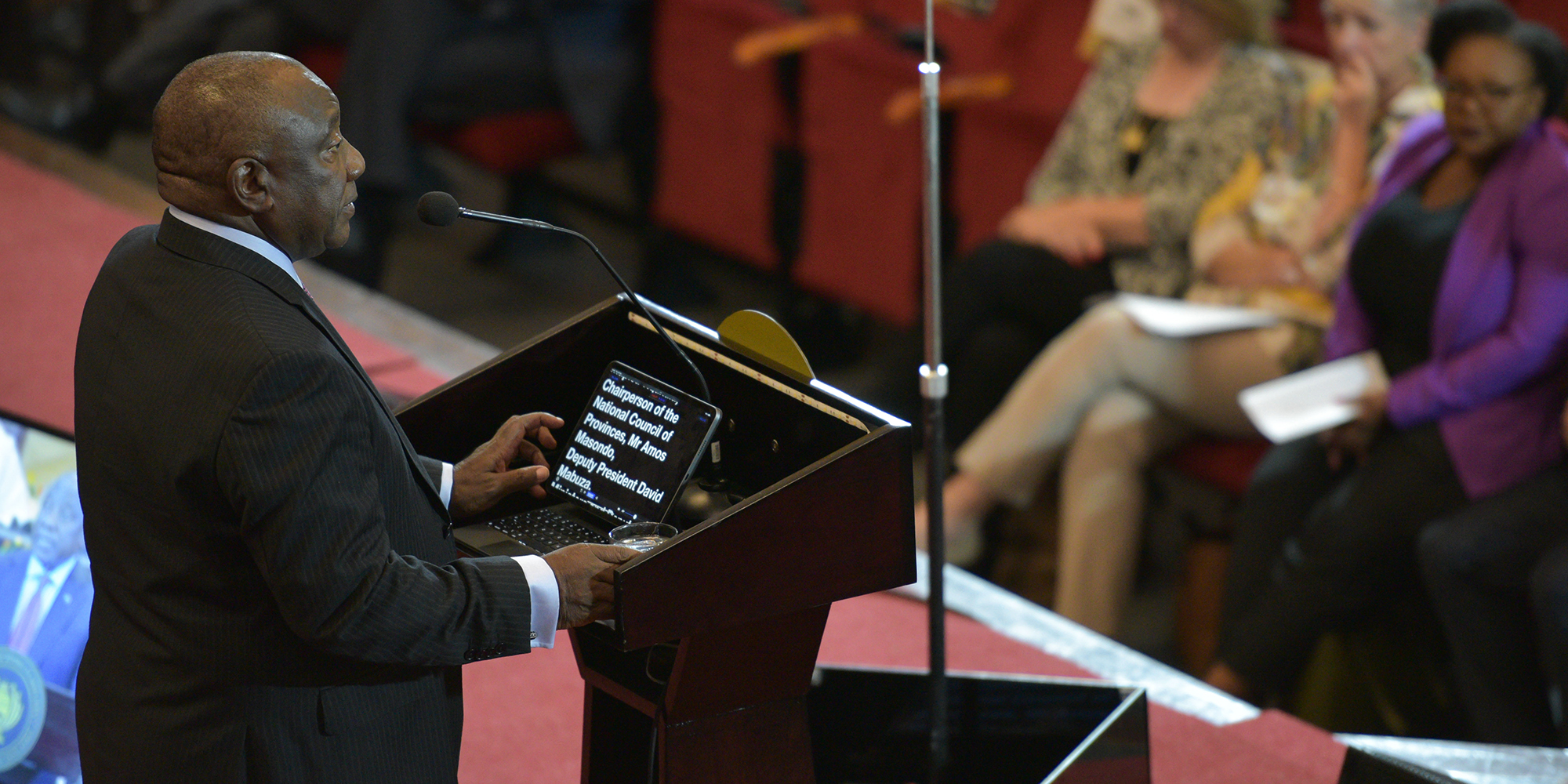It was a meandering speech that lasted just short of 60 minutes, which started with President Cyril Ramaphosa greeting ANC backbencher Paul Mashatile in his role of ANC deputy president as part of the welcome to leaders of political parties represented in Parliament.
It ended with thanks to Deputy President David “DD” Mabuza for his “unwavering support” over the past five years and “the work he has done for this nation and all of us”.
Mabuza had “indicated his wish to step down from his position. This is a request I am considering and attending to”, said Ramaphosa.
After weeks of speculation and political noise about a Cabinet reshuffle, the presidential greeting and thanks signal an acknowledgement of patience running out, if not the roil in the governing party.
/file/dailymaverick/wp-content/uploads/2023/02/ED_435086.jpg)
Ramaphosa would not have missed that at least two ANC speakers during the parliamentary debate on his State of the Nation Address (Sona) publicly recognised Mashatile in the ANC seats.
It’s not the first time the ANC has had a different deputy president in Luthuli House to the one in the Union Buildings, but it is the first time that the governing party’s deputy president sits in the parliamentary benches waiting for his appointment as second-in-charge in the government, never mind the traditional ANC blather about doing the will of the branches.
In 2005, Deputy President Jacob Zuma stayed put in the party as deputy president even when President Thabo Mbeki fired him over corruption scandals on 14 June that year as his deputy in government. Zuma subsequently resigned his parliamentary seat. But the July 2005 ANC National General Council overturned a National Executive Committee decision that Zuma should vacate the party’s deputy presidency.
On Thursday, when Ramaphosa delivered his reply to an acerbic two-day debate on his Sona, ANC contestation still needed to play itself out — both in party and government.
It was the contestation across the party political landscape that Ramaphosa addressed with what seemed to be disappointment about the lack of enthusiasm for his call for joint action to solve South Africa’s “challenges”, and his measures to end rolling blackouts with a State of Disaster and the appointment of an electricity minister in his Presidency.
Both measures were roundly criticised by opposition speakers over the past two days as unnecessary, further duplication and bloating a “mega-Presidency”.
Read more in Daily Maverick: “Reshuffle ‘nanny Cabinet’, fire non-performing ministers and stop ‘mega-Presidency’, Scopa chairperson tells Ramaphosa”
Describing critics as “merchants of despair” and talking of their “dishonest and self-serving rhetoric”, Ramaphosa said: “They have determined that their political fortunes are best served by depicting a country in chaos — instead of being parties that acknowledge the challenges and that are determined to work together to find solutions so that we leave no one behind.”
‘Extremely difficult circumstances’
Putting electoral prospects above people, argued Ramaphosa, showed a lack of appreciation for his administration’s achievements despite “extremely difficult circumstances”, including the Covid-19 pandemic, public violence and State Capture.
/file/dailymaverick/wp-content/uploads/2023/02/ED_435085.jpg)
He maintained that South Africa had come a long way and achieved “progress that is plainly clear to everyone who cares to look”.
And he ticked off, again, strengthening institutions such as the National Prosecuting Authority and the South African Revenue Service; State Capture arrests and prosecutions; the Presidential Employment Stimulus that focuses on youth; and support for the vulnerable during the two-year Covid-19 lockdown restrictions.
Now rolling blackouts are the defining challenge. Every single day of 2023 so far has had scheduled power cuts that at Stage 6 can leave households and businesses without power for up to 12 hours a day.
“Our priorities in 2023 are to decisively resolve the electricity crisis, reduce unemployment and root out corruption and crime,” Ramaphosa told parliamentarians on Thursday.
“Foremost among these [challenges] are the actions needed for the resolution of the electricity crisis.”
He said a State of Disaster would ensure agility to remove red tape that hampered energy security. And solar panel subsidies for businesses and households would be announced in the Budget on 22 February, repeated Ramaphosa.
Other measures that are widely expected include putting as much as R230-billion of Eskom’s R400-billion debt on the government’s books.
Visit Daily Maverick’s home page for more news, analysis and investigations
Segue to the electricity minister in the Presidency that Mineral Resources and Energy Minister Gwede Mantashe explained was a project manager.
“The minister will be responsible for driving the various actions being coordinated by the National Energy Crisis Committee to end load shedding as a matter of urgency. [Resolving rolling blackouts] requires the undivided attention of a political principal who does not need to split their time and energies among different important responsibilities,” said Ramaphosa.
“The minister of electricity will be focused day in and day out only on addressing the load shedding crisis, working together with the management of Eskom and the board. The minister will be leading the National Energy Crisis Committee and interacting with all other departments in the spirit of cooperative governance.”
It was not a duplication, or a fragmentation or a foundation for ministerial turf wars.
“As Minister Mantashe said, urgency of execution and delivery is paramount. We don’t have the luxury of time,” said Ramaphosa.
And with that, Mantashe, also the ANC national chairperson and a close Ramaphosa ally, became the only minister the President actually named, not just mentioned by title, in both his Sona and Sona reply speeches. DM





 President Cyril Ramaphosa during the 2023 response to the State of the Nation Address debate at Cape Town City Hall on 16 February 2023. (Photo: Gallo Images / Jeffrey Abrahams)
President Cyril Ramaphosa during the 2023 response to the State of the Nation Address debate at Cape Town City Hall on 16 February 2023. (Photo: Gallo Images / Jeffrey Abrahams)